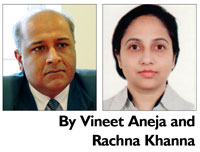 The Constitutional Bench of the Hon’ble Supreme Court (SC), over-ruling the earlier decision of three-member Bench re State of A.P. v. Kone Elevators (India) Ltd1, has held that the activity of manufacturing, erecting, installing and commissioning of a lift (an elevator) is indeed a ‘works contract’ and not a ‘contract for sale of goods’. It held that a contract for supply and installation of a lift is a composite contract for supply of goods as well as provision of service, and that the service element is obvious in such a contract. Thus, the activity of supply and installation of a lift would constitute to be a works contract. The Constitutional Bench, thus, reversed the earlier decision based on the logic that the major component was the lift and that the skill and labour employed was only incidental to the supply of the lift and that this is a contract for sale of goods. In order to appreciate this decision of the Apex Court, it is necessary to delve into the genesis of evolution of the law with respect to a ‘works contract’. It all started with the decision of the Supreme Court re State of Madras vs Gannon Dunkerley & Co.2 wherein the Apex Court held that the term ‘sale of goods’ involves transfer of property in movables from the buyer to the seller for a price, pursuant to an agreement to sell. It was further held that a building construction contract is an indivisible contract involving the supply of goods and services and the supply of materials used in such a contract cannot be treated as ‘sale of goods’. This was followed by a plethora of other similar decisions stating that an indivisible contract of sale of goods and provision of service could not be vivisected just to make one portion i.e. sale of goods, subject to sales tax. To undo this legal position, the Parliament brought in the 46th Amendment to the Constitution by incorporating Clause (29A) in Article 366. This granted States the power to levy tax, inter alia, on activities like works contracts, treating the sale as sale of goods. After this Constitutional amendment, the States have amended their legislations pertaining to levy of sales tax on works contract. However, this incorporation of Article 366 (29A) of the Constitution, as well as the changes made by State legislations, were first challenged re Builders’ Association of India and Other vs Union of India and Others3 which upheld the amendment so made. The SC also opined that the States had the power to segregate the value of goods used in the execution of works contract by a legal fiction to make it exigible to sales tax. Even recently, the SC re Larsen and Toubro Limited and another vs State of Karnataka and another4 clearly laid down that ‘dominant intention test’ is not at all material to determine whether or not there was any intention to transfer property in goods in the agreement. It held that even if the dominant intention was not to transfer the property in goods and rather it is the rendering of services or the ultimate transaction is transfer of immovable property, even then it is open for the States to levy sales tax on materials used in such contracts if it otherwise has elements of works contract. Thus, the basic concepts emerging out of the decisions of Apex Court are (a) the works contract, by legal fiction, can be vivisected to make value of goods used exigible to sales tax; (b) the concept of ‘dominant nature test’ for treating a contract as a works contract is not applicable; (c) the term ‘works contract’ as used in Clause (29A) of Article 366 of the Constitution is not to be narrowly construed; and (d) once the characteristics of works contract are met with, any additional obligation would not change the nature of the contract. This judgment5, passed by a 4:1 majority, will have far reaching consequences in indirect tax matters and is expected to bring a welcome respite to one and all in the industry sectors including real estate, infrastructure and many sectors where works contract take place. This would also help in resolving a large number of pending litigations. Footnotes |
Clasis Law
14th Floor, Dr Gopal Das Bhawan,
28, Barakhamba Road
New Delhi 110 001, India
Tel: (91) 11 4213 0000
Fax: (91) 11 4213 0099
Email: manoj.mishra@clasislaw.com
anchal.arora@clasislaw.com
www.clasislaw.com































